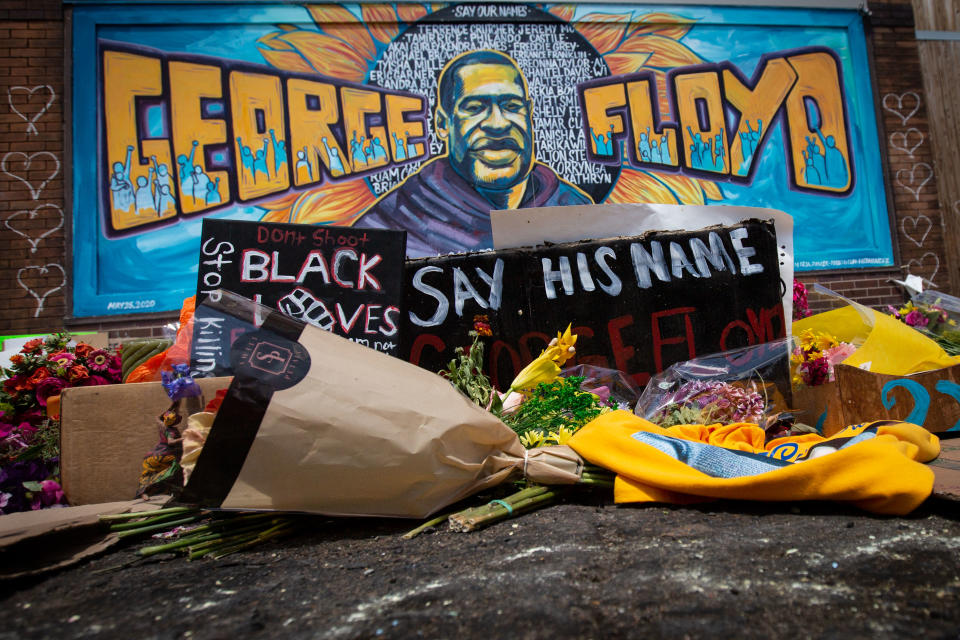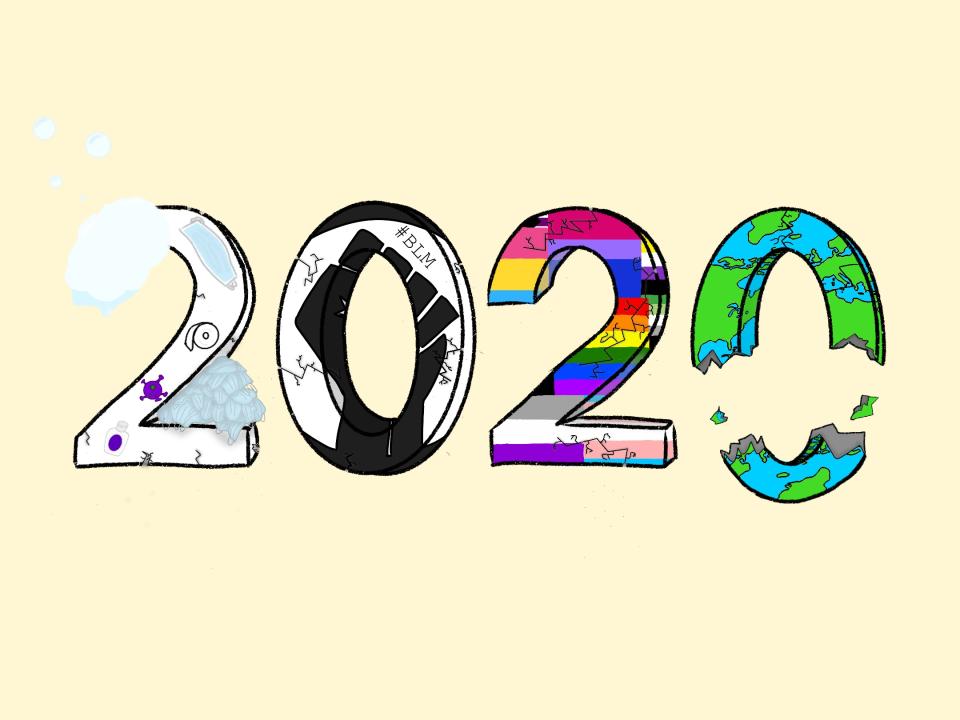How this week changed America forever

After nights of rage and perhaps the beginning of reconciliation, one thing is clear. This is a week that changed America.
Acknowledging and denouncing racism in our society became accepted, maybe even required, by mainstream Corporate America.
It’s crazy this took so long.
It’s by no means universal.
There are many battles ahead.
Still, our nation moved. That much is indisputable.
Unlike previous episodes of racial violence and killings, (and there have been so many and of course it was the cumulativeness of those acts that got us to this point), a company might have denounced a specific act or even more likely, simply ignored it. Wading into those waters was too big a risk. Now the CEOs have to get wet. Jump in or be pushed, you choose. Just know the old rules no longer apply.
Racism has become a one-sided issue in America. Can you imagine? That it hasn’t always been is our nation’s stain.
“Leaders have been called on to do more, to stand up,” says Ella F. Washington, a professor at Georgetown University’s McDonough School of Business and an executive coach who has taught workshops on diversity and inclusion. “Silence is not working. Not being in conversations, avoiding talking about race—that’s no longer acceptable.”
Think back on everything that happened this week, Washington D.C. police shooting pepper bullets, gassing and pummeling a path for the president’s bible thump photo-op in front of a church, the killing of a retired (African American) St. Louis Police captain by looters, a 75-year-old man in Buffalo smashed to the ground by police, thousands of arrests, and countless journalists assaulted.
Time to stand up indeed.
Who heard the call?
Not surprisingly Nike was out front. Social statements are in this company’s DNA. The company dropped an ad eight days ago that denounced racism. New CEO John Donahoe doubled down in a memo to employees yesterday saying that “Nike needs to be better than society as a whole,” and committed $40 million over four years to support black communities.
“Nike has been courageous,” Washington said. “Other companies like Ben and Jerry’s have been phenomenal in accountability, authenticity, and strength of voice. Ben and Jerry’s ‘we must dismantle white supremacy’ sets the bar. It’s direct, in your face, and confronting a difficult part of the conversation.” (Speaking of white supremacy, read this piece about Silicon Valley. There aren’t any black people even in the TV show.)
Also crossing the tape yesterday, Walmart pledged $100 million over five years with CEO Doug McMillon announcing the money would go to a new center on racial equity.
But Walmart has nothing on Bank of America, which pledged $1 billion to combat racism in the communities it serves. “Hats off to [CEO Brian Moynihan],” says Jeffrey Sonnenfeld, a Yale School of Management professor who organized a high-profile CEO conclave this week that focused on racism. “He’s a humble guy who’s putting money where his mouth is and coming through this magnificently well.”
“The events of the past week have created a sense of true urgency that has arisen across our nation, particularly in view of the racial injustices we have seen in the communities where we work and live,” Moynihan said. “The racial injustice we see today, which many of you and your families experience all too often, is unacceptable to all of us.”
It’s gratifying and overdue that there’s almost a competition to see who can pony up the most. Lord knows the companies owe it. (Do I have to explain?)
Other high-profile CEOs like Tim Cook, Jamie Dimon, Larry Fink and Marc Benioff and Hans Vestberg, CEO of our parent company Verizon, all made strong statements and put money down.

Let’s be honest though. These are businesses. Leaving aside what might be the legitimate feelings of these CEOs, it behooves these companies to jump on board. Nike and Ben & Jerry’s are serving their brands and their customer base by taking these stances. Twitter and YouTube were taken to task for speaking up against racism, as it was pointed out—on their own platforms of course—their business models foster divisiveness.
As for the Washington Redskins supporting Blackout Tuesday, AOC shot that hypocritical fish in a barrel. (“Want to really stand for racial justice? Change your name.”) AOC also called out companies in general for just talking the talk, and reminded them they would need to walk that talk by supporting and promoting African American employees, customers and their communities.
So yes, there is self-interest, there is hypocrisy, but there is also something much more. And I don’t think we’re turning back.
To make that case, let’s look now at some statements that are a bit more surprising.
ExxonMobil, a sort of Barry Goldwater of the Fortune 500, seemed to move off the dime, emailing Yahoo Finance: “The entire ExxonMobil community is very saddened by the tragic events in Minneapolis and elsewhere in the U.S. We do not tolerate discrimination of any kind. Racial discrimination has no place in our society or our company.”
Thanks for joining us, Exxon.
And then last night, NFL Commissioner Roger Goodell, never at the forefront of racial politics, made a video in which he said “We, the National Football League, admit we were wrong for not listening to N.F.L. players earlier and encourage all to speak out and peacefully protest. We, the National Football League, believe Black lives matter.” This was done in response to a firestorm that began when Saints QB Drew Brees showed he still didn’t get it in an interview with Yahoo Finance’s Dan Roberts. Players denounced Brees. Trump supported him. Then came Goodell last night. (And then as I was about to publish, Brees apologized again and told off President Trump.) Whew!
And speaking of sports, how about Michael Jordan? MJ, famous for avoiding politics, most infamously when he declined to support Charlotte Mayor Harvey Gantt who was running for U.S. Senate from North Carolina in 1990 against the racist (yes, he was) Jesse Helms. Jordan referencing his lucrative Nike (!) Air Jordan contract said: “Republicans buy sneakers too.”
His Airness has changed his tune now: “I know this country is better than that, and I can no longer stay silent,” MJ said as part of his statement.
Maybe most remarkable though was 90-year-old Pat Robertson, founder of the Christian Broadcasting Network, one-time presidential candidate, a leading voice of evangelicals and usually an ally of the president. The 90-year-old Robertson denounced Trump for the way he violently cleared out protestors for his photo-op in front of the church. “You just don't do that, Mr. President,” Robertson said. “It isn't cool!"
Robertson hasn’t exactly been an arbiter for cool in our society. But who knows, the times they are a changin’.
Leaving aside some Fox pundits and Twitter trolls, who didn’t cover themselves in glory this week? Tiffany for one, says Ella Washington, though not for a lack of trying. “Tiffany’s response was abysmal. Something about how we love everyone. So tone deaf to the pain of the black community specifically.” (Perhaps we should cut Audrey Hepburn’s favorite company a little slack as they’re embroiled in a troubled takeover deal with LVMH. On the other hand what does that have to do with being tone deaf?)
It’s worth noting some others here, like Arkansas Senator Tom Cotton, whose New York Times Op-ed “Send in the Troops,” created an outcry amongst readers and a mini-insurrection by the Times staff. (I’m sure the Senator is all broken up about all that.)
And did you read about Charles Negy, a psychology professor at University of Central Florida, the author of “White Shaming: Bullying based on Prejudice, Virtue-Signaling and Ignorance,” who described African Americans as a privileged group “shielded from legitimate criticism,” according to the Tampa Bay Times. There are calls for Negy, who’s long-tenured, to be fired. In an interview with the New York Times, Negy defended his remarks, asking, “Why would I resign?”
No doubt there are many more Charles Negys out there.
All of what happened this week made me think about two conversations with two very different CEOs.
The first was an interview in February by Yahoo Finance’s Sibile Marcellus of Roger Ferguson, CEO of TIAA, the giant money management firm with over $1 trillion in assets. “All of us who are people of color have faced discrimination one way or another,” Ferguson said. “And even as a CEO I cannot walk down the street without sometimes having unusual things happen that might be attributed to race. Here in New York, trying to get a cab heading uptown continues to be a bit of a problem. So let’s be clear there is discrimination still.”

I remember being surprised that this incredibly accomplished, Harvard PhD, and former vice chairman of the Board of Governors of the Federal Reserve would sometimes have trouble hailing a cab. Now I realize that of course he does and me not recognizing it shows I’m living in a bubble.
The second was an interview I did in the spring of 2016 with the late legendary oilman T. Boone Pickens. We were talking politics and I asked him what he thought about Barack Obama. And Boone said to me that he thought Obama was “the worst president we’ve ever had.” The worst? Seriously? I remember being shocked, and following up by asking him why he would say that. (Some would argue that Obama is at the other end of the spectrum of course, but at the very least Franklin Pierce, Herbert Hoover, Andrew Johnson and Richard Nixon are all indisputably worse, even from the perspective of a rock-ribbed Republican that Boone was.) And Boone replied with some sort of comment about Obama’s policies and so forth.
I should have pushed Boone harder and asked this: “Boone, is it possible you think Obama is the worst president at least in part because of racism—conscious or unconscious—on your part?” But I didn’t and now I realize I should have.
On May 17, 2004, Massachusetts legalized same-sex marriage. The move was not popular in all quarters. That same year George Bush supported a constitutional amendment to define marriage as between a man and a woman and W made it an issue in his re-election campaign. Eleven years later, same-sex marriage became legally recognized in all 50 states. And that same year, 2015, Bush reportedly offered to officiate at a same-sex wedding of family friends’.
The pace of change in our society is an ever-fluctuating constant. When it comes to racism in America, change has been way too slow.
Now the winds of change are stirring.
This article was featured in a Saturday edition of the Morning Brief on June 6, 2020. Get the Morning Brief sent directly to your inbox every Monday to Friday by 6:30 a.m. ET. Subscribe
Andy Serwer is editor-in-chief of Yahoo Finance. Follow him on Twitter: @serwer.
Read the latest financial and business news from Yahoo Finance
Read more